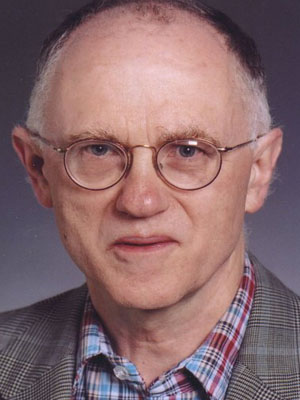
Dr Robert B. Griffiths ’52

2003 Dr Robert B. Griffiths ’52
Throughout his career, Robert Griffiths has dedicated himself to forming a lasting link between theory and reality. Born in Etah, Uttar Pradesh, in 1937 to Presbyterian missionaries, Robert attended Woodstock from fourth standard to tenth, along with his brothers and sisters. He graduated from Woodstock as a member of the Class of 1952. Even during his Woodstock days, Robert’s mathematical and scientific aptitude was apparent. The 1952 Whispering Pine notes: ‘Robert is famous for his long arguments (and unsurpassed knowledge) in Chemistry class, his ability to recite the log tables indelibly written in his brain, and his skill when it comes to fixing anything electrical.’ This knack for electrical systems kept Robert at Woodstock through part of 1953, working with the school’s various wiring systems.
Following his time at Woodstock, Robert attended Princeton University, where he earned a BA in Physics in 1957. He then earned an MSc and PhD in Physics from Stanford University in 1958 and 1962 respectively. He was a Postdoctoral Fellow of the University of California, San Diego, from 1962 to 1964, Assistant Professor at Carnegie Mellon University from 1964 to 1967, becoming Associate Professor in 1967, and Professor in 1969. Since that time, Robert’s academic contributions have been widely recognised. He was awarded a Phi Beta Kappa in 1956, was a National Science Foundation Postdoctoral Fellow from 1962 to 1964, an Alfred P. Sloan Research Fellow from 1966 to 1968, a Simon Guggenheim Foundation Fellow in 1973, and a recipient of the US Senior Scientist Award of the Alexander von Humboldt Foundation in 1973. In 1981 he was awarded the A. Cressy Morrison Award of the New York Academy of Sciences and in 1984 the Dannie Heineman Prize for Mathematical Physics, and in 1987 he was elected to the National Academy of Sciences.
Within his work and research, Robert’s primary focus has been in the field of quantum mechanics. Of the research, he has commented: ‘Quantum mechanics is hard to understand not only because it involves unfamiliar mathematics, but also because the usual discussion in textbooks about how to relate the mathematics to the real world is incomplete.’ It is this application of quantum information to the ‘real world’ that Robert strives for. In 1984 he initiated a research programme that sought to supply the missing link between theory and application while working out an entirely consistent form of quantum theory. Including contributions by several key colleagues, the project eventually resulted in what is now commonly called the consistent (or decoherent) history approach to quantum theory, now effectively studied and applied in several areas of the field of quantum mechanics.
At present, Robert is the Otto Stern University Professor of Physics at Carnegie Mellon University. He has published over 140 articles, as well as the book Consistent Quantum Theory. He is a member of the Society of the Sigma Xi, a Fellow of the American Physical Society, and a Fellow of the American Scientific Affiliation. Robert’s research interests continue to include the foundations of quantum mechanics, quantum computation, and the relation of physical science to Christian theology.
